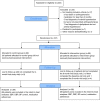Pharmacist intervention program to enhance hypertension control: a randomised controlled trial
- PMID: 21365405
- PMCID: PMC3042105
- DOI: 10.1007/s11096-010-9474-x
Pharmacist intervention program to enhance hypertension control: a randomised controlled trial
Abstract
Objective: Studies have demonstrated that hypertension remains inadequately managed throughout the world, with lack of adherence to BP-lowering medication being a major factor. The aim of the present study was to evaluate if a pharmaceutical care program could improve antihypertensive medication adherence and blood pressure control.
Setting: This study was conducted in a secondary care hypertension/dyslipidemia outpatient clinic in the university teaching hospital of Cova da Beira Hospital Centre, Covilhã, located in the Eastern Central Region of Portugal.
Method: This report evaluates the pharmacist's interventions during a prospective randomised controlled trial, from July 2009 to June 2010. Patients with diagnosis of essential hypertension attending the clinic for routine follow-up were randomly allocated either to a control group (no pharmaceutical care) or to an intervention group (quarterly follow-up by a hospital pharmacist during a 9-month period). The pharmacist interventions, aimed to increase medication adherence and blood pressure control, involved educational interventions and counselling tips directed to the patient.
Main outcome measure: Systolic blood pressure, diastolic blood pressure and blood pressure control (according to JNC 7 guidelines) assessed at the baseline visit and at the end of pharmaceutical care were the main outcome measures. Blood pressure measurements were performed by blinded nurses. Medication adherence was also evaluated, using a validated questionnaire at baseline and at the end of investigation. Results A total of 197 hypertensive patients were randomly assigned to the study (99 in the control group and 98 in the intervention group). Although there were no significant differences (P > 0.05) in both groups concerning mean age, gender, body mass index, and antihypertensive pharmacotherapy, blood pressure control was higher in the intervention group (P = 0.005) at the end of the study. Significant lower systolic blood pressure (-6.8 mmHg, P = 0.006) and diastolic blood pressure (-2.9 mmHg, P = 0.020) levels were observed in the intervention group. Medication adherence was also significantly higher in the intervention group at the end of the study (74.5% vs. 57.6%, P = 0.012).
Conclusion: Pharmacist intervention can significantly improve medication adherence and blood pressure control in patients treated with antihypertensive agents.
Figures
References
-
- De Macedo ME, Lima MJ, Silva AO, Alcantara P, Ramalhinho V, Carmona J. Prevalence, awareness, treatment and control of hypertension in Portugal. The PAP study. Rev Port Cardiol. 2007;26(1):21–39. - PubMed
-
- Collins R, Peto R, MacMahon S, Hebert P, Fiebach NH, Eberlein KA, et al. Blood pressure, stroke, and coronary heart disease. Part 2, Short-term reductions in blood pressure: overview of randomised drug trials in their epidemiological context. Lancet. 1990;335(8693):827–838. doi: 10.1016/0140-6736(90)90944-Z. - DOI - PubMed
-
- Godley P, Pham H, Rohack J, Woodward B, Yokoyama K, Maue SK. Opportunities for improving the quality of hypertension care in a managed care setting. Am J Health Syst Pharm. 2001;58(18):1728–1733. - PubMed
Publication types
MeSH terms
Substances
LinkOut - more resources
Full Text Sources
Medical


